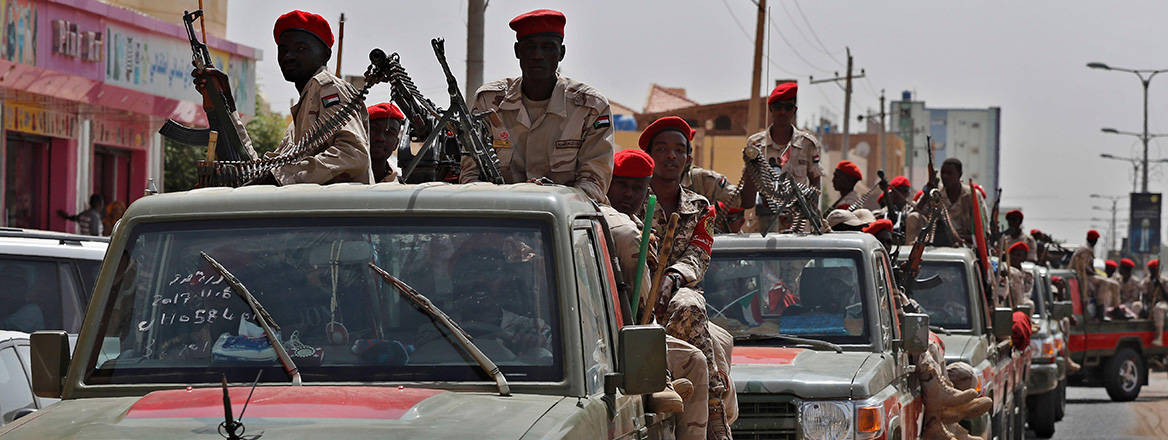RUSI
|
|
Building on Sand? The Perils of Peacemaking in Sudan
Amid daily atrocities and a growing humanitarian catastrophe, the task of peacemaking in Sudan is urgent – but the international community cannot limit itself to dealing with the warring generals.

After 16 months of civil war, Sudan increasingly resembles a ‘failed state’, with displacement and man-made famine driving one of the ‘worst humanitarian disasters in recent memory’. Following early setbacks, the Sudanese Armed Forces (SAF) – bolstered by Iranian-supplied drones – made sizable gains in January and February, retaking tracts of Omdurman and Bahri, Khartoum’s sister cities. Though over-stretched, the opposing Rapid Support Forces (RSF) still holds much of the capital, including the sprawling Al-Jaili oil refinery; has made inroads across South Kordofan, Geizra, and Sinnar State; and has consolidated control over its western heartlands. Having seized four of Darfur’s five provincial centres, only El-Fashar – home to 1.8 million people – remains in army hands and is now under heavy bombardment. Described as Sudan’s ‘Srebrenica’, the siege is both a strategic milestone and the latest example of a distinct system of violence, one of mass atrocity and ethnic cleansing running parallel to the conventional conflict.
At the same time, patterns evident at the outset of hostilities – namely, a proliferation and diffusion of fighting – have persisted, contributing to a confused and steadily fragmenting battlespace. Grand epithets – SAF’s ‘battle of dignity’ or RSF commander Mohamed Hamdan ‘Hemedti’ Dagalo’s ‘battle for democracy’ – do little to clarify this landscape, implying a turf war between two ‘broadly coherent’ blocs rather than a ‘mosaic of competing militia and rebel movements, each with their own interests and agendas’. Unfortunately, international diplomacy appears reliant on these bifurcated narratives in practice if not in rhetoric, ignoring the realities of Sudan’s political market and reducing ‘conflict resolution’ to a choice between ‘anti-democratic’ and ‘anti-state’ forces. Faltering ceasefire negotiations in Geneva – though well-intentioned – risk becoming the latest iteration of such trends, raising questions over the internal dynamics of its participants and the implications these have for peacemaking.
Diplomacy Revamped?
In late July, the US State Department pitched a new round of dialogue between SAF and the RSF, co-hosted by Switzerland and Saudi Arabia, to better enable humanitarian access and agree a ceasefire. Despite benefitting from unusual levels of regional buy-in, neither party ultimately engaged in negotiations – the army boycotted, and Hemedti reneged. Though not surprising, the outcome speaks to the inherent difficulties of brokerage, and the perseverance of those involved in achieving even incremental gains such as opening the Adre border-crossing between Chad and Sudan. But Geneva also reflects the same problems besetting past efforts in Jeddah, with its limited inclusivity and shelving of ‘broader political issues’ eliciting little more than ‘motion without movement’. While a full appraisal of these shortcomings is available elsewhere, it is worth unpacking two overlapping dynamics in detail, given their impact on future interventions: the increasingly volatile disposition of Sudan’s warring parties; and the challenge of bridging elite bargains with more meaningful solutions.
Anti-State Spoilers?
The RSF’s behaviour offers a classic vignette of a bad-faith actor. By accepting the invitation to Geneva, Hemedti once again attempted to exploit peace talks as a means of reviving his reputation, employing liberal jargon to boost his legitimacy and present himself as an ‘indispensable part of Sudan’s future’. In truth, his group – a ‘motley assortment of tribal militias and warlords’ – has no real appetite for delivering stability, let alone peace, as gradually became self-evident. After lauding their own ‘determination to alleviate the suffering of the Sudanese people’, his delegates abruptly withdrew from proceedings altogether, derailing the agenda in a cynical display of gesture politics. The experience – as with Jeddah – is damaging but also instructive, showcasing the RSF as a rapacious, ever more unwieldy criminal enterprise, one posing an existential threat to social cohesion with little incentive (or ability) to restrain the identity-based violence it benefits from.
The outcome is nothing short of a routinised and systemic process of de-institutionalisation – vandalism in the absence of political vision
Hemedti’s recent ‘political ploys’ are, in many ways, a return to the half-baked proto-populism he has touted since 2019. For years, security across Sudan’s borderlands was outsourced to the RSF, with his men gradually assuming ‘social provision and insurance functions’ alongside a stake in harvest management, healthcare and local infrastructure. Seed capital and vocational training were doled out ‘à la International Monetary Fund… recipes’; contract farmers profited from new irrigation systems, canals and solar cells; and company towns like Zurrug received clinics and prefab schools. Subsidised by a lucrative ‘enclave economy’ (featuring everything from banking and tourism to mining and mercenaries), this pseudo-civic largesse enabled the RSF to market itself as a champion of social change, ostensibly empowering the country’s nomadic underclass. Of course, the framing was mostly cosmetic, used to drum up support among Mahariya clansmen while whitewashing Hemedti’s political credentials. Beneath revolutionary tropes and old egalitarian slogans, the group remained a patronage machine for the Dagalo family – an admixture of ‘employment bureau, protection racket, and commercial conglomerate’ – rather than an authentic expression of rural emancipation. Nevertheless, it did start to reflect (and leverage) genuine grievances, building up the aesthetic of governance – from medical centres to a child protection office – as a means of laundering its public image. As journalist Matt Nashed reported back in 2021, there was a ‘coordinated plan to paint the RSF as the saviour of Sudan’.
With the outbreak of fighting, any semblance of this political project has disappeared. Colloquially dubbed the ‘Republic of Kadamol’, disparate experiments in paramilitary rule amount to little more than a ‘pillage state’, a synonym for atrocity, brigandage and sexual violence ‘indelibly coloured by a toxic Arab-supremacist ideology’. Reports of harassment, abuse, arbitrary arrest, and summary executions by RSF troops are widespread, with UN analysts investigating the deaths of 10,000 to 15,000 people in El-Geneina alone. Much of the violence appears ethno-centric, levelled at black African (Massalit, Fur, Burgo and Zaghawa) neighbourhoods using ‘tactics, techniques, and procedures’ recycled from the early 2000s. Densely populated suburbs such as Ardamata were deliberately shelled before RSF and Tamazuj militia went ‘door to door, shooting young men’ while shouting racial slurs (‘abeed’ and ‘nawab’). As several witnesses recall: ‘… people were rammed by vehicles, burned alive in their homes, and picked off in the streets by snipers’, their bodies ‘left to rot in the sun’. Once a regional hub, El-Geneina now resembles a ‘ghost town’, with analogous trends emerging across cities like Zalingei and Nyala. As Volker Perthes, the UN’s former Special Representative to Sudan, warns, the war in Darfur is akin to ‘ethnic cleansing, grand scale’.
The full scope of this self-induced anarchy remains unclear: not only is third-party access to RSF-run areas difficult, but the group still retains a sophisticated PR system. Proxy outlets in Dubai fabricate content for foreign consumption, showcasing the restoration of pharmacies and markets, (staged) reconciliation efforts, and aid distribution via the so-called Sudanese Agency for Relief and Humanitarian Operations. A string of ‘special bulletins’ were even found circulating Westminster early in the conflict. At the same time, Hemedti has attempted (with some success) to project himself as a statesman, touring South Africa, Uganda, Djibouti, Ghana, Rwanda, Ethiopia and Kenya (on an Emirati jet) to improve his diplomatic standing. These are not just perfunctory but predatory exercises, helping to literally ‘scrub away … evidence of [RSF] crimes’. In reality, his gunmen continue to methodically destroy local infrastructure – telecommunication masts, hospitals, schools and wells – while starving communities of food and medical supplies. Tactical advances are often accompanied by a ‘collapse of …state services’ and the ‘wanton looting’ of ‘homes, warehouses, and vehicles’. Occupied districts of Khartoum appear ‘lawless’, the token deployment of RSF police and field-courts offering cover for mass-expropriation and asset-stripping. Across Nyala, any pretence of administration has been dropped entirely, with Abdel Raheem Dagalo, Hemedti’s brother, leaving ‘day-to-day governance’ to native leaders – policies replicated in Wad Madani and Geizra State. As Suliman Baldo, a regional expert, explains to Al-Jazeera: ‘the RSF doesn’t have the capacity to manage population centres and to provide an alternative to government systems … they are not hiding it, and this is why they are asking people to do things themselves’. The outcome is nothing short of a routinised and systemic process of de-institutionalisation – vandalism in the absence of political vision.
Worryingly, these conditions could deteriorate further. Following a massive ramp-up in wartime recruitment, the RSF is no longer a bounded entity under Dagalo control but a confederation of tribal groupings with discrete issues and interests. Yes, the pathology may be cross-cutting: ‘militarised masculinities’ bred by a collective history of social marginalisation, resentment and deprivation. Many stakeholders also share similar aspirations, at least on an abstract level, of ‘building a home for people like them[selves], nomadic communities that want to rest … and … [find] stability’. But there is little prospect of delivery by a coercive regime bent on extraction, where ‘paramilitary colonels double up as administrators, skilled only in running [extortion] rackets’. Paramount chiefs received cars, money and military office in exchange for support and local knowledge, with much of the rank-and-file either forcibly conscripted or attracted by easy spoils. These ties are hardly sufficient for holding a coalition together, especially if land and loot run dry. El-Geneina is indicative as the new (RSF-backed) governor, Tijani Karshoum, quickly became sidelined by a raft of traditional leaders, ‘each controlling their own territory’. In this context, the so-called ‘Janjaweed rebranded’ may be susceptible to the same patterns of fragmentation as its predecessor, with the aleutaawa – Arabs across Darfur and Kordofan – competing over resources, property and position. With the defection of Musa Hilal, a long-time rival of Hemedti and head of the Mahamid clan (kin of the Dagalo’s Mahariya), this disassembly could already be starting.
The RSF’s involvement in peace talks therefore brings major challenges. With his men scaling up the genocidal tactics used two decades previously, any concessions to Hemedti under the rubric of ‘conflict resolution’ risk contravening international humanitarian law and hindering urgently needed atrocity prevention. Importantly, his dependency on local militias and ‘ethno-mercenaries’ also leaves the resonance of elite-level bargains somewhat ambiguous. Having created a movement united by little more than ‘conquest’ and criminality, it is questionable how far the Dagalos could actually rein in the social upheaval it has unleashed, even if it wanted to.
Anti-Democratic Preferences?
As noted by Daniel van Oudenaren, there is a temptation (particularly online) to frame the war as a dialectic between ‘bad and less bad’, with RSF abuses making SAF appear palatable by comparison. Cast as a familiar fixture in the public imagination, the army’s ‘
Original article link: https://rusi.org/explore-our-research/publications/commentary/building-sand-perils-peacemaking-sudan


